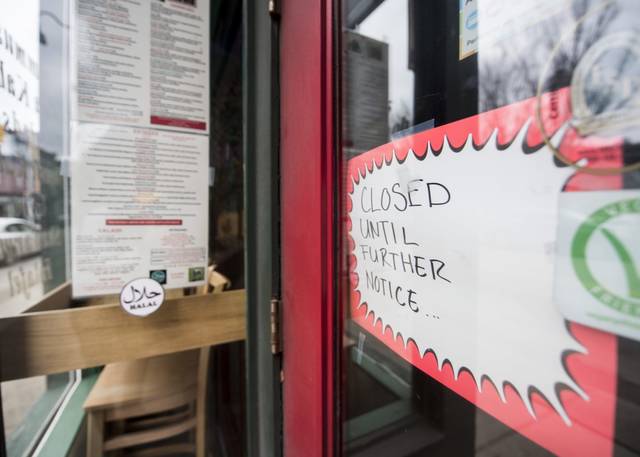https://naviga.triblive.com/opinion/michael-krol-amid-covid-19-outbreak-dont-worry-about-your-wealth/
Michael Krol: Amid covid-19 outbreak, don’t worry about your wealth

Cities began shutting down. Schools were closed. The government began limiting public activities to curtail the spread of the virus.
That describes the atmosphere over the past few weeks as covid-19 spread rapidly across the globe, creating a multitude of fears that were seemingly unfathomable. But people had the same fears during the 1918 Spanish flu pandemic. That virus would wipe out, by some estimates, nearly 5% of the world’s population. It struck all ages. Healthy young adults would wake one morning healthy and die in their sleep that night.
Reassuringly, according to medical experts and historians alike, covid-19 does not pose anywhere near the health and mortality threat of the Spanish flu, one of the deadliest pandemics in history.
Today’s pandemic has stricken the country with legitimate health fears, but also an equal, if not greater, economic fear. Small businesses are closing their doors, laying off employees, and wondering if and when their doors will reopen. Since March 9, the U.S. stock market has seen a litany of historic “worsts.” And the business lending markets are gasping for air in the midst of uncertainty, threatening to grind even larger businesses and industries to a halt.
However, comparing the market and economic impact of the Spanish flu to what is happening today, I can say confidently that this will pass. You need not fear a significant long-term faltering of our economy and stock markets.
The Spanish flu had a negligible impact on the stock market through its conclusion in 1919. Historians even find it difficult to tease out the negative impact of the pandemic compared to World War I, which was simultaneously creating headwinds for the markets. Despite the combination of both pandemic and war, the stock market was not nearly impacted in the realm that it has been in the past two weeks. Let’s also not forget that the overall economy subsequently launched into the period of economic prosperity known as the “Roaring ‘20s” shortly after the pandemic dissipated.
Does this mean the covid-19 pandemic will be a precursor to an unprecedented era of economic prosperity? No one knows.
Does this mean you should gain comfort in the economy’s outlook, given that even one of the deadliest pandemics of all time was only a blip on the radar in terms of economic prosperity and the stock market? Yes — and here are three reasons why:
• Our country is taking bold action to shut down this pandemic quickly and stabilize the economy and markets. The Federal Reserve has put forth efforts to stabilize credit markets, and just this week, the Senate passed an aggressive $2 trillion stimulus package intended to support the U.S. economy in the weeks ahead. These measures have been designed to simultaneously help those who need it through the short-term pain, while also lessening a more significant and longstanding economic and societal burden.
We also have a playbook from other countries whose initial efforts appear to have successfully curbed the virus, and also countries that have not. For example, South Korea’s campaign to test widely and quarantine infected individuals is limiting the spread of the virus in dramatic proportions, compared to other countries that became infected around the same time and failed to take action.
And while the accuracy and timeliness of data from China, where the outbreak began, can be contested, China has effectively shut down the spread of the virus and is reporting that over 90% of all people infected have recovered.
• The stock market’s precipitous decline of past weeks should not be of concern, even to investors who have temporarily seen their accounts decline by millions. There are many aspects of the operation of today’s stock market which, in context, explain why. First and foremost is that every day the stock market looks forward and tries to predict the future based on information that is not yet known. In other words, the stock market is constantly contemplating and pricing in worst-case scenarios before they might happen.
When fear and uncertainty enter this environment, along with the real-time information (accurate and otherwise) available to most citizens of the country, you have a recipe for the exaggerated outcomes we’re experiencing in the current markets. If you believe that a pandemic shown to be curtailable in less than a few months cannot possibly permanently wipe out 30% of the annual earnings of the 500 largest companies in the country, then you should not worry about the stock market or what your account value was when you logged in last night.
• Simply put, we’ve seen a heck of a lot of medical advances since 1918. Medical experts could not “see” a virus in 1918 the way we can today, let alone develop a vaccine that began testing in just weeks. Beyond that, there are much better sources of information. Not only is covid-19 leagues less deadly than the Spanish flu, our medical system is also 100 years advanced in its ability to combat it.
Today is a time to take precautions regarding your health, and focus on the safety and well-being of your family and friends, to band together and support others in a temporarily difficult situation, whether it is the local restaurant that can only serve take-out orders or a displaced friend who could use some extra work.
It is not a time to be overly concerned about the long-term state of our economy, markets and wealth. Like the Spanish flu, this, too, shall pass.
I would suggest enjoying time with family, catching up on favorite binge-worthy TV shows and learning how to operate businesses effectively across distance — and maybe ignoring stock-tracking apps for a little while.
Michael Krol is a partner and head of wealth advisory at Waldron Private Wealth in Bridgeville (mkrol@waldronpw.com).
Copyright ©2026— Trib Total Media, LLC (TribLIVE.com)
